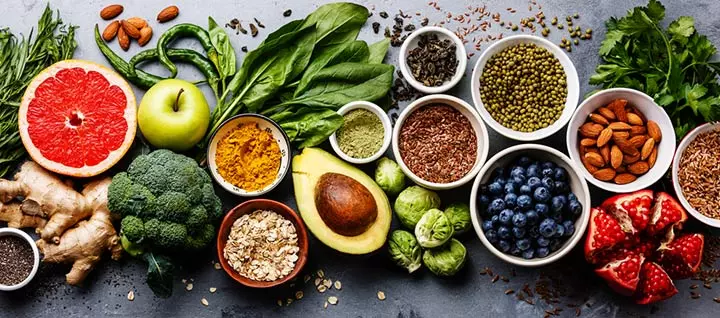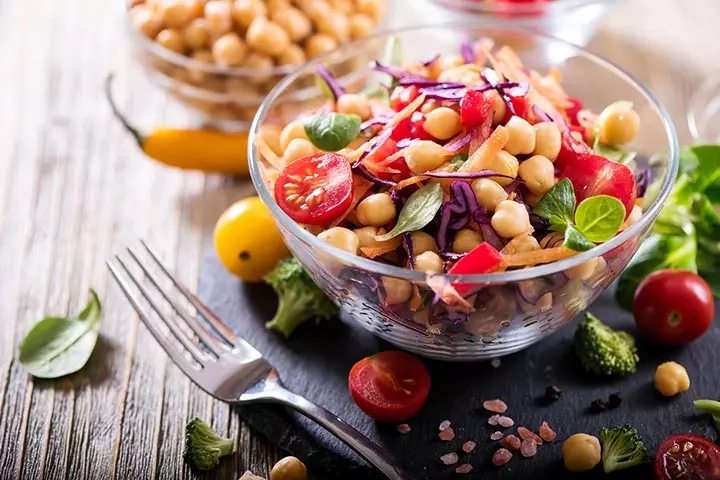
If you’re a new mom, you would have heard that breast milk is the healthiest food your baby can ever get. It’s true! Breast milk is considered the gold standard of nutrition for babies and has numerous health benefits. Apart from being the best food for your little one, it also improves their immune system. That’s not all! The benefits of breastfeeding are not limited only to the baby. Mothers also benefit from it to a large extent. Plus, it reduces stress levels and produces feel-good hormones like oxytocin and prolactin in mothers, promoting positivity, confidence, and self-esteem (1).
The quality and production of milk are directly dependent on the mother’s health conditions. So, mothers should put in the care and effort in watching what they are consuming on a regular basis. Therefore, it’s crucial that you consume the right foods to help replenish your energy, health, and overall well-being. Asking friends and peers might give you a garden variety answer with regards to nutrition. Breastfeeding nutrition can be confusing — what should you eat and how much should you eat? If you have these questions about your breastfeeding diet, you’ve come to the right place. Keep reading to find out:
1. Extra Calories: Is That A Yes Or A No?

Image: IStock
First, let’s look at a few facts about breastfeeding nutrition. The most common question that a breastfeeding mother may ask is if she should consume extra calories while nursing. After pregnancy, your body is in recovery mode. You are also probably working towards losing all that pregnancy weight, and so consuming extra calories might seem like a bad idea. However, it’s essential to include some extra calories in your diet. About 330-400 extra calories a day would be ideal for a nursing mother to give her the energy she needs to produce sufficient milk (2).
2. What Should You Eat?

Image: Shutterstock
It’s quite obvious that you have to consume nutrient-dense food items while breastfeeding, but what are these foods? Let’s dive right in and check out what you should eat while nursing (3):
- Follow a protein-rich diet including fish, eggs, meat, dairy, poultry, seeds, nuts, and beans, two-three times a day.
- Add two servings of fruits and about three servings of vegetables to your diet per day, including dark green and yellow vegetables.
- Add whole grains to your everyday diet, including whole wheat bread, pasta, cereal, and oatmeal.
- Drink lots of water to keep yourself well hydrated.
3. How Much Fluid Do You Need?

Image: Shutterstock
Eating the right foods is vital while breastfeeding but another critical aspect of your diet is your fluid intake. The rule of thumb is to drink water whenever you’re thirsty. Another helpful tip would be to keep a bottle of water by your side and sip from it throughout the day. If you notice that your urine is dark yellow, it means that you might have to drink more water. Also, drink a glass of water (or a healthy beverage of your choice) every time you breastfeed. Keeping a bottle with a quantity marker is a great way to keep track of your water intake. Looking at the current levels of water in the bottle you would be able to ascertain if you’re keeping up with your body’s requirements.
If you don’t want to drink plain water, you could add a few citrus fruits to give it some flavor. Lemons, oranges, sweet limes, and other such fruits may help. You could also add mint leaves, ginger, basil, or cilantro to add some flavor to your water. Infusions work great as compared to shakes or juices, the level of calories is low and the drink also feels lighter. Infusions with cucumber and mint are even considered to be having detox properties.
Ensure that you’re not consuming excessive amounts of sugary drinks. Too much sugar could lead to weight gain and sabotage your efforts to lose pregnancy weight. Also, steer clear of too much caffeine. Avoid consuming more than 16 to 24 ounces of caffeine in a day as it could interfere with your baby’s sleep (2).
4. Breastfeeding Diet Tips For Vegetarians

Image: Shutterstock
If you’re a vegetarian, don’t be disheartened or worried about a lack of nutrition. Several plant-based foods are rich in protein, iron, and calcium as well. For example, lentils, peas, dried fruits, soy, nuts, seeds, and whole grains are good sources of nutrition.
You might have to take some supplements to fulfill your nutritional needs, especially for vitamin B-12. It is difficult to find vitamin B-12 in a vegetarian-based diet because it is almost exclusively found in animal products. Similarly, omega-3 fatty acids and vitamin D are also essential for your baby’s health. Therefore, speak to your health care provider and get the necessary intake of supplements.
5. Foods To Avoid While Breastfeeding

Image: IStock
Now that you know what to eat, let’s look at a few things you should avoid while breastfeeding. Alcohol is a big no when it comes to nursing mothers. Even small traces of alcohol in your breast milk could be harmful to your baby. Therefore, if you’ve consumed even a little, wait for it to exit your system before you feed your baby. Typically, it takes about two to three hours for the liquor to leave your system, depending on your body weight. Consider pumping and dumping before you feed your baby (4).
Although some amount of fish is good for you, seafood generally contains high levels of mercury which could be harmful to your baby. Therefore, avoid consuming seafood that’s high in mercury, like swordfish, king mackerel, and tilefish. Other things to avoid are smoking (obviously) and excessive caffeine.
Breastfeeding can be a beautiful experience, but it’s also one that has to be taken seriously. Everything you consume will be transferred to your baby through your breast milk. Therefore, it’s important to take your diet seriously. We hope this article helped you with some of the questions you might have had about breastfeeding nutrition. We would love to hear about some of the dietary you have for fellow breastfeeding moms out there. Comment below and let us know!
References
- Breastfeeding and Health Outcomes for the Mother-Infant Dyad
https://www.ncbi.nlm.nih.gov/pmc/articles/PMC3508512/ - Nutrition Recommendations in Pregnancy and Lactation
https://www.ncbi.nlm.nih.gov/pmc/articles/PMC5104202/ - Diet for Breastfeeding Mothers
https://www.chop.edu/centers-programs/breastfeeding-and-lactation-program/diet-breastfeeding-mothers - Drinking alcohol while breastfeeding. Will it harm my baby
https://www.ncbi.nlm.nih.gov/pmc/articles/PMC2213923/
Community Experiences
Join the conversation and become a part of our nurturing community! Share your stories, experiences, and insights to connect with fellow parents.












